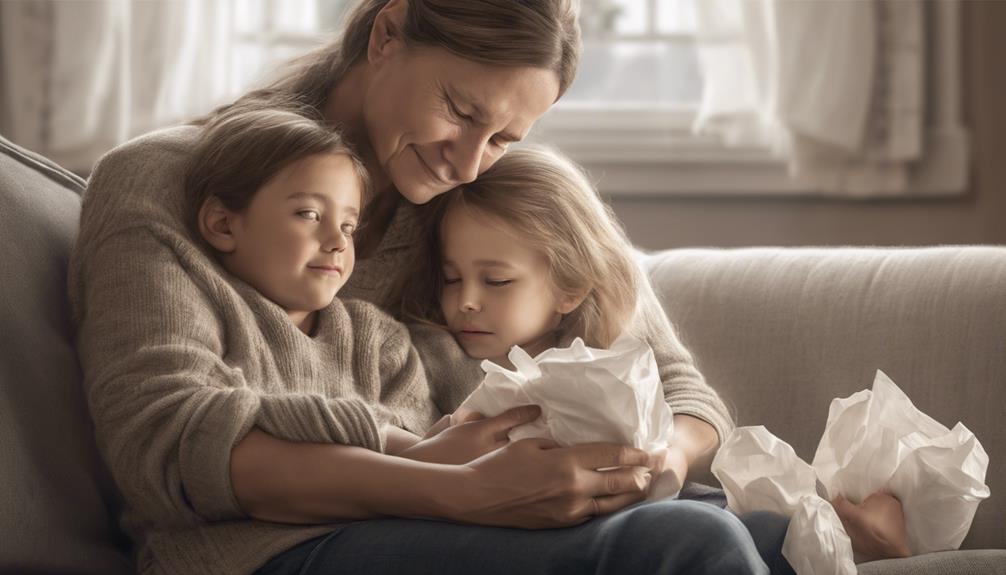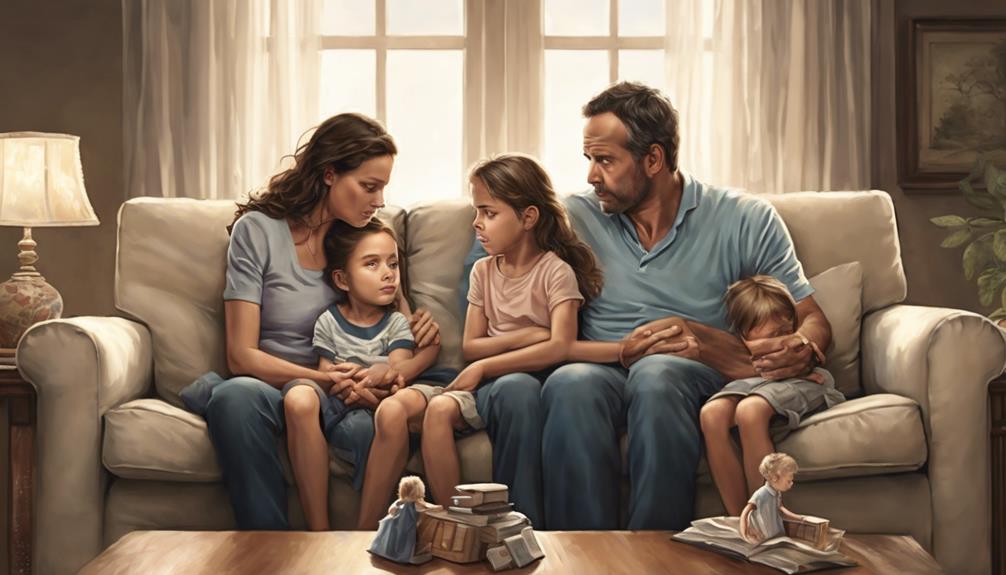When telling your kids about your divorce, collaborate with your spouse. Stay unified and minimize emotional distress. Prepare for various reactions; kids may feel anxious or blame themselves. Choose a peaceful time to talk, not during holidays or heightened emotions. Approach as a team to avoid confusion. Tailor your message to their age with simple language. Acknowledge changes in living arrangements and reassure them. Provide ongoing support, communicate openly, and consider therapy if needed. Address common concerns like living arrangements and future events. Support their change with love and communication. For more insights on this sensitive topic, explore further resources.
Key Takeaways
- Choose a calm, private time to talk.
- Explain in simple terms tailored to their age.
- Reassure them it's not their fault.
- Emphasize both parents' love and support.
- Encourage questions and provide ongoing reassurance.
Planning the Conversation
When planning the discussion to inform your kids about the divorce, cooperating with your spouse is vital to establish a united front and minimize emotional distress for the children. By working together, parents can provide a consistent message and reassure their children that they're still a team in parenting, despite the changes taking place.
It's important to choose an appropriate time for this conversation, avoiding holidays or other emotional moments that could add extra stress to an already challenging situation. If communication with your spouse is difficult, consider involving a mediator to facilitate the discussion and make sure that both parents' perspectives are heard.
Talking to your children together demonstrates a shared commitment to their well-being and helps them feel supported during this shift. Developing a non-blaming narrative is also essential in order to avoid placing children in loyalty binds or making them feel responsible for the divorce. By approaching this conversation with care and consideration, parents can help their children navigate this challenging period with understanding and support.
Anticipating Reactions

To prepare for children's potential reactions to the news of the divorce, parents should be ready for a wide range of emotions that may arise, such as sadness, confusion, anger, and fear.
- Children may blame themselves for the divorce, feeling responsible for the situation.
- It's common for kids to experience anxiety, uncertainty, and fear of the unknown.
- Addressing children's reactions with empathy and reassurance is essential for their emotional well-being.
- Providing a supportive environment and open communication can help children navigate the challenges of their parents' divorce more effectively.
Understanding that children's reactions can vary widely and being prepared to support them through these emotions is vital. By acknowledging their feelings, offering comfort, and maintaining open lines of communication, parents can help their children cope with the changes resulting from the divorce. This proactive approach can foster resilience and emotional stability in children during this challenging time.
Choosing the Right Time

Consider the timing of the conversation carefully, ensuring your children are in a relaxed and receptive state before discussing the divorce. It's vital to choose a time when your kids are well-rested, calm, and not distracted. Avoid bringing up the topic during holidays, special occasions, or times of heightened emotions. Create a safe and comfortable environment at home to have this important discussion with your children. It's recommended that both parents be present during this conversation to demonstrate unity and provide support to the children.
If communication between parents is challenging, consider seeking the assistance of a therapist or mediator to facilitate the conversation. By selecting the right time to talk to your children about the divorce, you can help ensure that they're better able to process the information and emotions surrounding this significant family change. Remember, creating a supportive and understanding atmosphere is key during this difficult conversation.
Approaching as a United Front

Presenting a united front when informing their children about the divorce helps establish a sense of stability and security within the family unit. This approach guarantees that the children feel supported and loved during this challenging time. Here are some key reasons why approaching as a united front is vital:
- Demonstrates cooperation and agreement between parents
- Prevents children from feeling caught in the middle or choosing sides
- Provides reassurance that both parents are still there for them
- Fosters a sense of consistency and minimizes confusion
Tailoring to Childs Age

Tailoring the conversation to a child's age is crucial when discussing divorce. By utilizing age-appropriate language, parents can guarantee that their children comprehend the situation without feeling overwhelmed.
Addressing specific concerns and providing reassurance and support are essential components in helping children navigate through the challenges of divorce.
Age-Appropriate Language
When talking to young children about divorce, it's crucial to provide a straightforward explanation, focusing on who'll be moving out and where they'll live. It's important to use simple, concrete language to help them understand the changes happening in their family.
Here are some key points to keep in mind when discussing divorce with young children:
- Keep it simple: Use clear and easy-to-understand language.
- Focus on the present: Reassure them about where they'll live and who'll be taking care of them.
- Encourage questions: Let them know it's okay to ask anything they want to know.
- Provide reassurance: Offer lots of love and support to help them feel safe during this time.
Addressing Specific Concerns
Addressing children's specific concerns about divorce involves tailoring the conversation to their age and maturity level to guarantee effective coping mechanisms. For children aged 0 to 5, provide simple explanations about who is moving out and where they will live. Children aged 6 to 11 may blame themselves, so acknowledge their feelings and reassure them. In the 12 to 14 age group, encourage discussions and respect their independence. Age-appropriate books about divorce can help children process their emotions. By adapting your communication to your child's age and maturity, you can address their concerns and emotions effectively.
| Age Group | Approach |
|---|---|
| 0-5 | Provide simple explanations |
| 6-11 | Acknowledge feelings |
| 12-14 | Encourage discussions |
Providing Reassurance and Support
To provide reassurance and support tailored to a child's age during the discussion of divorce, it's essential to acknowledge and validate their feelings while using age-appropriate language and concepts. Children may experience fear, anxiety, anger, or sadness, so it's important to address these emotions based on their developmental stage.
Here are some key strategies to take into account:
- Tailor the explanation to the child's age group.
- Acknowledge and validate the child's feelings.
- Use age-appropriate language and concepts.
- Provide reassurance about what'll remain consistent in their lives post-divorce.
Addressing Concerns

When addressing concerns about the divorce with your children, it's important to acknowledge their emotions and fears. Reassuring them of your continued love and support can help alleviate some of their anxiety.
Encouraging open communication allows them to express their concerns and questions freely.
Kids Emotions and Fears
Reassure your children that they'll continue to be loved and cared for throughout the divorce process, addressing their fears and concerns with empathy and understanding. Children may experience a range of emotions and worries during this challenging time. It's essential to acknowledge their feelings and provide a safe space for them to express themselves.
To help children navigate their emotions and fears effectively, consider the following:
- Validate their emotions and concerns.
- Encourage open communication.
- Discuss how routines will remain consistent.
- Offer support and comfort through active listening and reassurance.
Reassurance and Support
As children navigate the complexities of their emotions and fears during a divorce, providing reassurance and support becomes paramount in fostering their well-being and understanding. Reassure children that the divorce isn't their fault and that they're loved unconditionally.
Encourage open communication for children to express their feelings and concerns about the divorce. Address how the divorce will impact their lives, including changes to living arrangements or routines. Discuss potential adjustments to holidays, vacations, and special occasions post-divorce.
Acknowledge uncertainties and involve children in discussions about future plans to provide a sense of stability. By offering reassurance, creating an open dialogue, and involving children in the process, parents can help their children navigate the challenges of divorce with greater understanding and support.
Providing Ongoing Support

To ensure children's emotional well-being post-divorce, consistent and open communication is essential for providing ongoing support. Encouraging children to express their ongoing concerns and feelings helps them navigate the changes more effectively. Reassurance and consistent love play a pivotal role in helping children feel secure during this challenging time. Offering opportunities for children to ask questions and express their emotions as needed fosters a sense of understanding and validation.
- Open Communication: Encourage children to share their feelings and concerns openly.
- Reassurance and Love: Provide consistent reassurance and love to help children feel secure.
- Emotional Expression: Offer opportunities for children to express their emotions and ask questions.
- Professional Support: Consider seeking therapy or professional help to support children through the divorce process.
Common Questions Kids Ask

When discussing the common questions kids ask about divorce, it's important to address their concerns with honesty and clarity. Children may ask why the divorce is happening, seeking a simple and honest explanation. They might inquire about where they'll live and how their daily routines will change.
Kids could wonder if the divorce is their fault, needing reassurance that it's not. They may also ask about future family events or holidays and how they'll be handled post-divorce. Additionally, kids may seek information on how their relationship with each parent will be maintained after the divorce.
Answering these questions openly and reassuringly can help children navigate this challenging time with better understanding and acceptance. Providing clear and age-appropriate responses can support children in processing their feelings and adjusting to the changes that come with divorce.
Supporting Your Child Transition

Consistently provide reassurance to your child that they're loved and that the divorce isn't their fault. Encourage open communication about their feelings and concerns regarding the divorce. Involve your child in discussions about how the divorce will impact their daily life and routines. Address potential changes to family traditions, holidays, and special occasions with your child.
Moving through a divorce can be challenging for children. It's vital to create a supportive environment where they feel heard and understood. By maintaining open lines of communication and involving them in discussions about the changes ahead, you can help them navigate this shift with more ease. Additionally, considering the impact on family traditions and special occasions can help your child adjust to the new normal. Seeking professional support, such as counseling, can also provide them with the tools to cope effectively during this time of change.
Frequently Asked Questions
At What Age Is a Child Most Affected by Divorce?
Between the ages of 6 to 11, a child is most affected by divorce. They may experience heightened emotions like fear and sadness and struggle with understanding the family unit breaking apart, leading to emotional turmoil.
How Do You Tell Kids You Are Getting a Divorce?
When informing kids about divorce, it's important to choose a peaceful time and provide a straightforward, honest explanation. Reassure them it's not their fault, promote open communication, and address potential changes together. It's about demonstrating love and support.
What Do You Say to Your Child When You Are Separating?
When separating, parents should reassure their child of unconditional love and support. They need to explain upcoming changes in a simple, age-appropriate manner, avoiding blame. Encourage open communication and address any concerns, emphasizing it's an adult decision.
How Do You Tell Your Kids You're Seeing Someone After Divorce?
When telling kids about dating post-divorce, be honest and considerate. Share the news gently, assuring them of your love. Involve them in discussions to foster understanding and a sense of inclusion. Take it slow to allow adjustment.
Conclusion
To wrap up, when informing your children about your divorce, keep in mind the saying, 'Honesty is the best policy.'
Strategize the discussion carefully, anticipate reactions, and approach as a united front with your ex-partner.
Customize your approach to your child's age, address their concerns, and provide ongoing support.
Be ready for common questions and help your child navigate through this challenging time.
Remember, open communication and support are crucial in aiding your child in managing this difficult situation.










